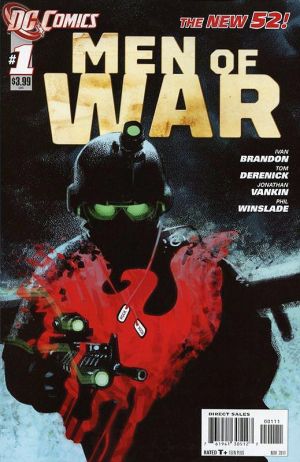Comics /
Comic Reviews /
DC Comics
Men of War #1
By Dan Horn
September 8, 2011 - 14:30
Grandson of the WWII hero Sgt Rock, Cpl Rock, has been pulled from active duty and entered into a covert para-military operation that involves super-powered beings and provides the basis for what might well be considered the graphical equivalent of
Battle: Los Angeles.
So, what do the film
Battle: Los Angeles and DC's new comic book series
Men of War have in common exactly? Well, really there are two apparent
commonalities:
Firstly, both perform poorly as genre mash-ups. In regards to
Men of
War, the story is a disjointed, torpid death march into the slightly
esoteric climes of the DC superhero universe. Rock and his squad are
carrying out some unspecified suicide mission or another with no discernible plan, fighting what
look like Iraqi Republican Guard rip-offs. They're constantly putting
themselves in danger while their posited ally Superman seems to hang back and simply watch
them come within inches of dying several times before intervening in
some nominal fashion. I'm trying to understand the structure of this
mission, and I'm finding it impossible to do. You've already sent Superman in to clean up this military outpost; why send in a handful of
vulnerable para-military contractors as well? I guess the para-military
commanders thought it would make for some good suspense.
Secondly, like
Battle: LA,
Men of War really could have benefited from
having a military liaison give this script a once over or from having
some more military research performed. One of the advantages/disadvantages of being
a veteran is seeing through really awful "military" jargon and
perceiving misuses of terms and phrases. It's easy to notice when the
writer doesn't know a whole lot about the armed forces and is just
pulling things out of his ass. A writer like Greg Rucka is a rarity in
the comics world. I don't know much about the man's personal life, but
somehow he's got some great insight on military and police vernacular
and scatology. Ivan Brandon, writer of
Men of War, does not. A lot of bad cliches and counterfeit
dialogue find their way into this book. I don't think anyone's ever
cried "Frag out!" when firing an
M203, I can't recall ever hearing
anyone use the words "five six cal" in that way or in that order, and
I'm pretty certain that a person can't fire an
RCLR while suspended from
a parachute. Recoilless doesn't mean it can be fired safely while
floating around in the air. It's like a middle-schooler with a hard-on for the U.S. Army wrote this stuff.
All of that's not to say there's not a place for civilian-written
military sagas, but there's a repugnant pretension here that you don't
find in stories like
Inglorious Basterds or
Kelly's Heroes. I found the
incessant explanations of acronyms and slang mildly insulting. If
there's no organic way of explaining those terms and you really don't
trust your readership to use any reference materials to find out what
they mean, then stop using them.
The follow-up feature at the back of this book, written by Vankin and illustrated by Winslade, is equally
groan-inducing, portraying SEALs bumbling around like idiots, getting
shot by untrained nationals of a nameless, analogous Middle Eastern
country, and casually spouting off hackneyed hero-worship silliness
while patching up wounded comrades. Worst of all is perhaps the ugly,
stereotypical caricature of a Muslim man using a woman as a meat shield
at the end of this story. It conjures up some pretty derogatory imagery,
reminiscent of the fanged Japanese from WWII comics of the 40s. It's
really pretty disgusting.
The artwork by Derenick and Winslade is very inconsistent and almost amateurish throughout this issue and feels more like something you would
see in a political publication from Bluewater Comics than something you should
get from a comics publishing giant. I'll be incredibly surprised if this
series survives another five months.
Rating: 2 /10
Last Updated: January 17, 2025 - 08:20
